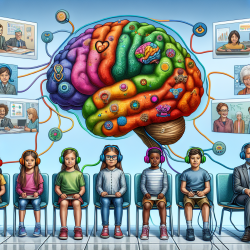Introduction
In the realm of adolescent health, understanding the interplay between traumatic brain injury (TBI) and alcohol misuse is crucial. A recent study titled "Cross-sectional examination of the association of co-occurring alcohol misuse and traumatic brain injury on mental health and conduct problems in adolescents in Ontario, Canada" provides valuable insights for practitioners. This blog explores the study's findings and offers guidance on how practitioners can leverage this data to improve outcomes for adolescents.
The Study's Key Findings
The study surveyed 3,130 Ontario adolescents and revealed significant associations between TBI, alcohol misuse, and adverse mental health and conduct outcomes. The data showed that:
- Adolescents with a history of TBI and hazardous drinking had significantly higher odds of experiencing mental health issues such as psychological distress and suicidal ideation.
- Conduct problems, including violent and non-violent behaviors, were more prevalent among adolescents with co-occurring TBI and hazardous drinking.
- The odds of adverse outcomes were higher for those with recent TBI compared to former TBI, emphasizing the need for timely interventions.
Implications for Practitioners
For practitioners, these findings underscore the importance of a holistic approach to adolescent care. Here are some actionable steps:
- Screening and Assessment: Implement comprehensive screening for TBI and alcohol misuse in adolescents. Early identification can lead to timely interventions.
- Integrated Care Plans: Develop care plans that address both TBI and alcohol misuse. Collaboration with mental health professionals can enhance treatment efficacy.
- Preventive Education: Educate adolescents and their families about the risks associated with TBI and alcohol misuse. Awareness can be a powerful tool in prevention.
Encouraging Further Research
While the study provides a robust foundation, further research is needed to explore causal relationships and long-term outcomes. Practitioners are encouraged to engage in or support research initiatives that delve deeper into these associations.
Conclusion
By integrating the study's findings into practice, practitioners can make data-driven decisions that significantly impact adolescent health outcomes. The interplay between TBI and alcohol misuse is complex, but with informed strategies, we can foster healthier futures for our youth.
To read the original research paper, please follow this link: Cross-sectional examination of the association of co-occurring alcohol misuse and traumatic brain injury on mental health and conduct problems in adolescents in Ontario, Canada.










